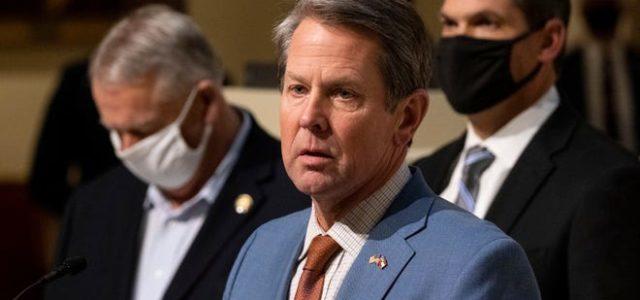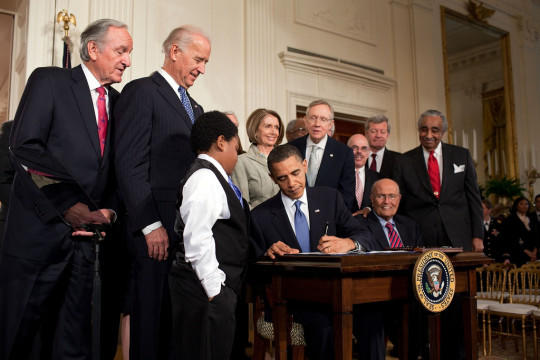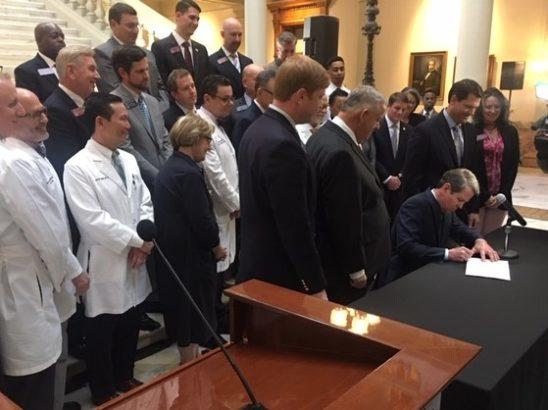
Section Branding
Header Content
Will New Incentives For Medicaid Expansion Sway Georgia Leaders?
Primary Content

Amy Bielawski is hoping for what seemed unlikely a year ago.
Back then, the Trump administration approved Gov. Brian Kemp’s Medicaid waiver plan for Georgia.
The plan would have added some people to the state’s Medicaid rolls, but it also would have set up new eligibility requirements for the program — such as employment or school enrollment. Bielawski, an uninsured Tucker resident, wasn’t sure she could meet any of those requirements.

She wanted to see Georgia do a standard, full Medicaid expansion under the Affordable Care Act (ACA), something that Republican leaders who control state government have long opposed as too costly.
But in January of this year, Democrat Joe Biden became president. He’s a big advocate of the ACA, unlike his predecessor, Republican Donald Trump, who fought unsuccessfully to scrap it.
Biden’s administration has shaken up the health care arithmetic nationally, and that could reverberate here in Georgia. For one thing, the incentives for a state to expand Medicaid have become much more enticing.
Bielawski, 56, is currently caught in what’s known as the “coverage gap.’’ Her income isn’t high enough for her to get discounts on health insurance bought on the ACA exchange, but it’s too high for her to be eligible for Medicaid.
Medicaid expansion, which would put more low-income adults on the program, would mean steady access to health care for Bielawski.
In recent weeks, federal health officials in the new administration have told Georgia they won’t go along with the requirements for Medicaid eligibility under the upcoming Kemp plan. The feds cited hurdles created by the pandemic.
The Kemp administration plans to appeal the feds’ decision. Kemp’s fellow Republicans in the General Assembly, such as House Speaker David Ralston, are backing him on this. “I’m hopeful that they will look favorably on what we’re trying to do, which is simply trying to tailor a Georgia solution to Georgia needs,” Ralston told reporters last week.
But now, the COVID relief package, just signed by Biden into law, has dangled enticing carrots for the 12 states, including Georgia, that have not done a full expansion of Medicaid.

The 11 others are mainly Republican-controlled, and mostly in the South and the West: Wyoming, Texas, South Dakota, Wisconsin, Mississippi, Tennessee, Alabama, North Carolina, South Carolina, Kansas and Florida.
States that expand the program at this point would receive an additional 5 percentage point increase in their regular federal Medicaid matching rate for two years. So over that time, even factoring in the costs of implementing expansion, Georgia would net $700 million under the new incentives, according to the Kaiser Family Foundation.
The Kemp waiver plan, as outlined now, is much less ambitious. It would cost $75 million for the first year, and cover just 31,000 low-income adults, according to the consumer advocacy group Georgians for a Healthy Future. A standard expansion would give Medicaid eligibility to 480,000 to 600,000 people in the state, said Laura Colbert, the group’s executive director.
“Medicaid expansion has always been the moral and cost-effective choice for Georgia,’’ she said. The new incentive package, she said, “just amplifies that choice.’’
Ball In Kemp's Court
Kemp, who has been highly critical of the COVID relief package, has strongly opposed Medicaid expansion.
And the Department of Community Health, which runs Medicaid in Georgia, says it’s still planning for the current waiver plan to take effect in July.
But with the feds unlikely to budge on his limited Medicaid waiver plan, Kemp would face only a handful of options. He could drop his waiver idea entirely, or pursue it without the extra eligibility requirements — which would be much more expensive than his original proposal.
Or he could think about expansion.

Brian Robinson, a Republican strategist who runs the consulting firm Robinson Republic, said the politics of expansion and the ACA, sometimes called Obamacare, have changed.
“The Biden administration isn’t going to allow any alternative other than full expansion of Medicaid,’’ Robinson said. And he added, “I think people have abandoned the idea of repealing Obamacare,’’ so it’s a reality to be dealt with.
Some Republican-led states have expanded Medicaid after letting voters decide the issue, Robinson noted. “In Utah, it passed by wide margins.’’
Republicans in Georgia can devise a referendum or opinion poll on the ballot, he said. “We do have a special session coming up for redistricting. We could do it then.’’
Opinion polls in recent years have indicated a majority of Georgians favor Medicaid expansion when asked about it. A ballot question on the idea could gauge Georgia voters’ actual interest.
“I know Gov. Kemp wants to do something,’’ Robinson said. From a political standpoint, he added, pursuing expansion would take away one of the main issues Democratic gubernatorial candidate Stacey Abrams talked about in 2018.
Kemp is “not going to suffer politically for doing it,’’ Robinson said.
It may take just one of the holdout 12 states to adopt Medicaid expansion to trigger similar moves in other states, experts say.
Georgia is run by Republicans at the state level, as it has been for several years. But Democrats have made recent gains, such as electing two new U.S. senators last year. And Democrats support expansion.
“It’s now up to our state leaders to take those resources, expand Medicaid and make sure no one in this state lacks access to health care because they can’t afford it,” U.S. Sen. Jon Ossoff (D-Ga.) said this week at a virtual town hall meeting, according to the AJC. “Because health care is a human right. If that hasn’t been clear before now, this COVID-19 pandemic has made it incredibly clear.”
Amy Bielawski can’t wait for Georgia to move to increase insurance coverage. Right now, she says, “I don’t think they care about people like me falling through the cracks.’’
This story comes to GPB through a reporting partnership with Georgia Health News.

